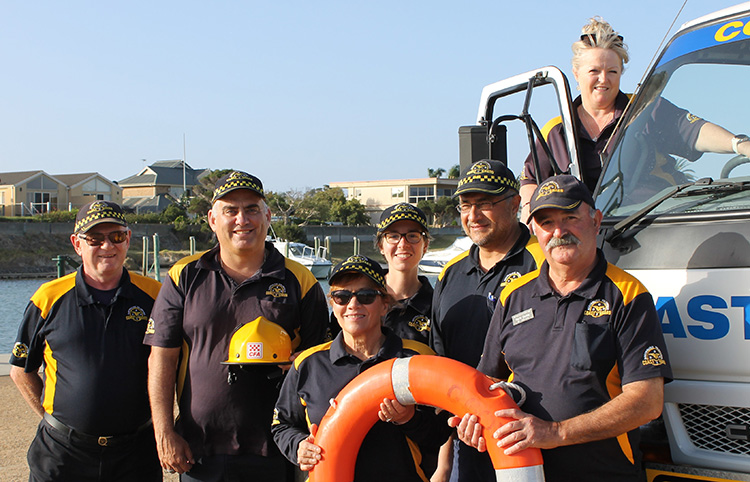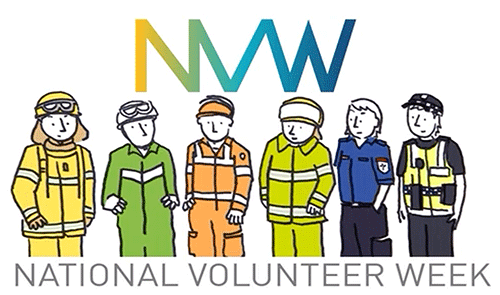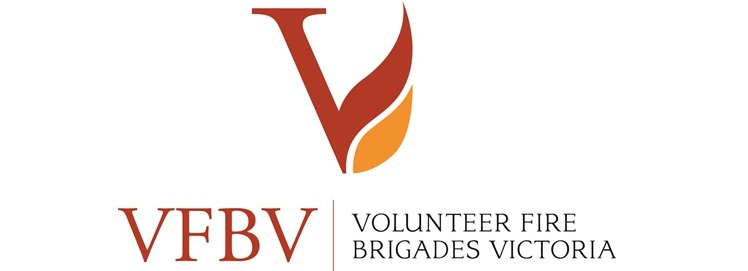A Coast Guard uniform might not be a sight you expect to see in the middle of a major bushfire, but they were a welcome sight indeed to firefighters at the Bunyip fires that devastated parts of Gippsland this fire season.
It isn’t widely recognised that Victorian volunteer Coast Guard units are also considered part of CFA, but they play a valuable role on land and at sea, making a world of difference to the safety of Victorians.
Matt Semmens, Squadron Commodore for Volunteer Coast Guard Victoria, said many people didn’t realise Coast Guard brigades had been officially part of CFA since 2008.
In fact, CFA volunteer Coast Guard units from the Melbourne suburbs of St Kilda, Hastings, Carrum, Frankston, Sandringham and Safety Beach were an integral part of the emergency response effort at the Bunyip fires, providing transport, logistics and catering deliveries to support the thousands of firefighters in active operations.
“In the normal run of events, Victorian Coast Guard units respond to emergencies 24-7. We also go out on the water every weekend to improve the safety of those on the water by providing advice and information, and assistance if needed. We can even go inland, as the recent fires showed,” Mr Semmens said.
Deanne Semmens, Deputy Flotilla Commander for Carrum Coast Guard, said volunteering in the Coast Guard was both challenging and rewarding. Victoria’s 19 Coast Guard units respond to more than 1000 incidents a year.
“We never close down,” she said. “We have boats going out every week. We have the capability to fight fires out on the water, if that’s needed but it’s mainly rescue work.”
Carrum, like other Coast Guard units, works with all types of marine users if they get into trouble or have questions on boating safety. The Coast Guard also runs Boat Licensing qualifications.
Like their more ‘traditional’ CFA counterparts, volunteers train every week, on top of their emergency response and their ‘on duty’ weekend activity. “The amount of training depends on what level you want to achieve – for example coxswain or crew have different training levels, so there’s something that can fit in with most peoples’ availability and capabilities,” Ms Semmens said.
“We’re in the classroom once a week at least, and there’s also speciality training like marine radio licensing and navigation. There’s always something different to do and that’s what makes it so interesting.”
Mr Semmens, who coordinated the participation of coast guard units during this season, said even CFA crews were sometimes surprised to see a coast guard unit so far from the sandy shores.
“We did get asked a few times where our boat was,” Mr Semmens said. “But when we broke out the food that changed their tune!” More than 60 flotilla members put up their buoys and volunteered more than 800 hours of service at the fires between 3 and 12 March.
“It was very surreal for a lot of the members; very different for those who were in the staging area, smelling and seeing the smoke across the skyline and the mass of trucks and firefighters, compared to seeing it on TV. Some flotilla members worked in the Incident Control Centre in Dandenong providing communications and organisational skills to move people, food, equipment, relief crews about, and others helped erect tents at the staging area, escorted milk and cattle trucks and helped ensure firefighters were fed, watered and rested.
Volunteer Fire Brigades Victoria (VFBV) CEO Adam Barnett said Coast Guard members mobilised during the fire season formed part of CFA’s world-respected surge capability – the ability to mobilise huge numbers of resources in short order and maintain those for days and even weeks if needed.
Learn more about CFA’s world-respected surge capacity on the VFBV website: https://vfbv.com.au/index.php/component/k2/item/568-cfa-s-volunteer-surge-capacity-essential-for-victoria
“There are many different roles that people can perform as a CFA volunteer, and the Coast Guard is a great community service that makes a world of difference to the safety of marine users,” Mr Barnett said.
“In Volunteer Week, I want to encourage Victorians to recognise and thank all emergency services volunteers for their sacrifice and their contribution to the greater good of Victoria and the communities in which they live.”
Research shows that volunteering not only enhances an individual’s sense of satisfaction and wellbeing, but volunteering builds significant public value and social capital, he said.
“Within the emergency management sector, the value of partnering with our communities and sharing responsibility through a collective sense of pride and purpose delivers enormous community benefits to the public such as an increased sense of safety, self-reliance and community confidence. All vital ingredients for strong, safe and resilient communities” he added.
In Victoria, CFA volunteers deliver a highly professional emergency service that is admired and envied around the world, with CFA volunteers making up 95% of Victoria’s firefighting forces.
They are highly trained and respond to urban, rural, residential, industrial and bush fires, motor vehicle accidents, marine incidents, hazardous materials incidents, rescues, floods and storms.

 |
This article is part of our National Volunteer Week Showcase - celebrating our wonderful CFA Volunteers. |
 |
About VFBV: VFBV is established under the Country Fire Authority Act and is the peak body for CFA Volunteers in Victoria. VFBV works tirelessly to represent, advocate and support CFA volunteers to the CFA Board and management, governments, ministers, members of parliament, councils, instrumentalities, business and the public. Our vision is for Strong Volunteerism, Embraced to Build Community Resilience for a Safer Victoria. |
 Championships
Championships 
